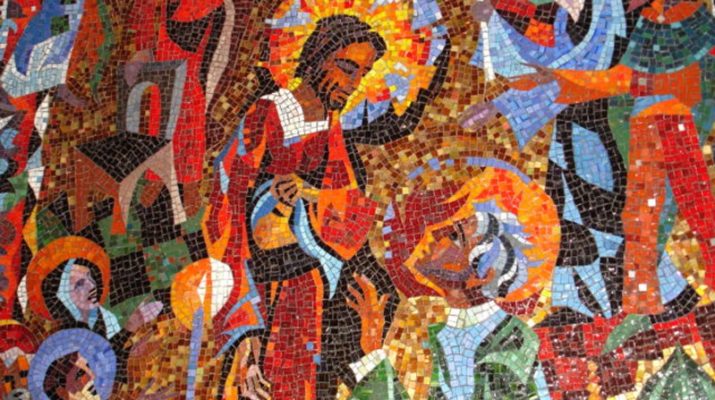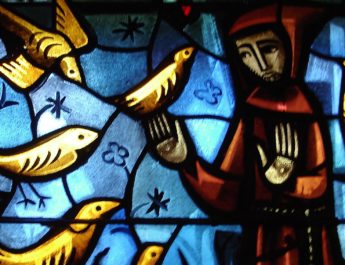John 20:19-31
Eastertide A21
BibleHub
19 When it was evening on that day, the first day of the week,A and the doorsB of the house where the disciplesC had met were locked for fearD of the Jews,E JesusF came and stood among them and said, “PeaceG be with you.”
Notes on verse 19
A “week” = sabbaton. From Hebrew shabbath (sabbath); from shabath (to rest, stop, repose, cease working; by implication, to celebrate). This is the sabbath. It can also be used as shorthand for a week i.e. the time between two sabbaths.
B “doors” = thura. This is opening or closure so it’s a door, gate, or entrance. Figuratively, this can refer to an opportunity.
C “disciples” = mathetes. From matheteuo (to make a disciple of); from manthano (to learn key facts, gain knowledge from experience; generally implies reflection as part of the learning process); from math– (thinking things through). This is a disciple, learner, or student. It is where we get “mathematics” from.
D “fear” = phobos. From phebomai (to flee, withdraw, be put to flight). This is panic flight, fear, fear being caused, terror, alarm, that which causes fear, reverence, respect.
E “Jews” = ioudaios. From Ioudas (Judah, Judas); from Hebrew Yehudah (Judah, son of Jacob, his tribal descendants, a name for the southern kingdom. Literally, it means praised); probably from yadah (to throw one’s hands into the air in a gesture of praise); from yad (hand). This is Jewish, a Jew, or Judea.
F “Jesus” = iesous. From Hebrew Yehoshua (Joshua, the Lord is salvation); {from YHVH (proper name of the God of Israel; the self-existent and eternal one); {from havah (to become) or from hayah (to come to pass, become, be)} + yasha (to deliver, defend, help, preserve, rescue; properly, to be open, wide or free, which implies being safe. So, in a causative sense, this is to free someone). This is Jesus or Joshua in Greek – the Lord saves or the Lord is salvation.
G “peace” = eirene. Perhaps from eiro (to join, tie together to form a whole). This is one, peace, quietness, rest, peace of mind, harmony. Peace was a common farewell among Jews (i.e. shalom) and this well-wishing included a blessing of health and wholeness for the individual. This word also indicates wholeness and well-being – when everything that is essential is joined together properly. This is peace literally or figuratively. By implication, it is prosperity (but not in the sense of excessive wealth. Prosperity would have meant having enough from day to day.)
20 After he said this, he showed them his handsH and his side.I Then the disciples rejoicedJ when they sawK the Lord.L 21 Jesus said to them again, “Peace be with you. As the Father has sentM me, so I sendN you.”
Notes on verses 20-21
H “hands” = cheir.This is the hand in a literal sense. Figuratively, the hand is the means a person uses to accomplish things so it can also mean power, means, or instrument.
I “side” = pleura. 6x in NT. This is the side or rib. It is where pleurisy comes from.
J “rejoiced” = chairo. From char– (to extend favor, lean towards, be inclined to be favorable towards). This is to rejoice, be glad or cheerful; a greeting. This is the root verb that the Greek word for “grace” comes from (charis).
K “saw” = horao. To see, perceive, attend to, look upon, experience. Properly, to stare at and so implying clear discernment. This, by extension, would indicate attending to what was seen and learned. This is to see, often with a metaphorical sense. Can include inward spiritual seeing.
L “Lord” = kurios. From kuros (authority, supremacy). This is a respectful address meaning master or sir. It refers to one who has control or power greater than one’s own. So, it was also applied to God and Jesus as Master or Lord.
M “sent” = apostello. From apo (from, away from) + stello (to send, set, arrange, prepare, gather up); {probably from histemi (to make to stand, stand, place, set up, establish, appoint, stand firm, be steadfast)}. This is to send forth, send away, dismiss, send as a messenger. It implies one that is sent for a particular mission or purpose rather than a quick errand. This is where “apostle” comes from.
N “send” = pempo. This is to send, put forth, or dispatch. This often refers to a temporary errand. It is sending someone with a focus on the place they departed from. By contrast, another Greek word, hiemi, emphasizes the destination and yet another word, stello, focuses on the motion that goes with the sending.
22 When he had said this, he breathed onO them and said to them, “Receive the HolyP Spirit.Q 23 If you forgiveR the sinsS of any, they are forgiven them; if you retainT the sins of any, they are retained.”
Notes on verses 22-23
O “breathed on” = emphusao. 1x in NT. From en (in, on, at, by, with) + phusao (to blow). To breathe into or on, to puff.
P “Holy” = hagios. From hagnos (holy, sacred, pure ethically, ritually, or ceremonially; prepared for worship, chaste, unadulterated, pure to the core; undefiled by sin; figurative for innocent, modest, perfect). God is totally different from humanity and thus set apart. That which is consecrated to worship God (elements of worship) or to serve God (as the saints) are holy because they are now set apart for God’s purposes. Holy because important to God. This is sacred physically, pure. It can be morally blameless or ceremonially consecrated.
Q “Spirit” = pneuma. From pneo (to blow, breath, breathe hard). This is wind, breath, or ghost. A breeze or a blast or air, a breath. Figuratively used for a spirit, the human soul or part of us that is rational. It is also used supernaturally for angels, demons, God, and the Holy Spirit. This is where pneumonia comes from.
R “forgive” = aphiemi. From apo (from, away from) + hiemi (to send). This is send away, release, permit, forgive, allow to depart, discharge, or send forth.
S “sins” = hamartia. From hamartano (to miss the mark, do wrong, make a mistake, sin); {from a (not) + meros (a part or share)}. Literally, this means not having one’s share or portion – like not receiving inheritance or what was allotted to you. This word means missing the mark so it is used for guilt, fault, and acts of sin.
T “retain” = krateo. From kratos (strength, power, dominion; vigor in a literal or figurative sense; power that is exercised). This is being strong or mighty so, by extension, to prevail or rule. It can also mean to seize, grasp hold of and thereby control. In this sense, it means arrest.
24 But ThomasU (who was called the Twin),V one of the twelve, was not with them when Jesus came. 25 So the other disciples told him, “We have seen the Lord.”
But he said to them, “Unless I see the markW of the nailsX in his hands, and putY my fingerZ in the mark of the nails and my hand in his side, I will not believe.”AA
Notes on verses 24-25
U “Thomas” = Thomas. 11x in NT. From Hebrew toam (twin). This is Thomas, meaning twin.
V “Twin” = didumos. 3x in NT. From dis (twice, utterly, again); from duo (two, both). This is Didymus, which means twin or double in Greek.
W “mark” = tupos. 16x in NT. From tupto (to strike repeatedly, wound, punish; figuratively to offend). This is a figure, model, image, impression, pattern, copy. Properly, this is a model created through much repetition so figuratively it is the proper model. It can be the impression of a stamped image, the mark of a scar, the shape of a statue. Figuratively, it can refer to a style or resemblance. Used specially, it is a model as something to imitate or as a cautionary tale. This is where the word “type” comes from.
X “nails” = helos. 2x in NT. This is a nail, stud, or spike.
Y “put” = ballo. This is to throw, cast, rush, place, or drop. It is throwing, but it could be with more or less velocity and with more or less force/violence.
Z “finger” = daktulos. 8x in NT. Probably from deka (ten). This is finger.
AA “believe” = pisteuo. From pistis (faith, faithfulness, belief, trust, confidence; to be persuaded or come to trust); from peitho (to have confidence, urge, be persuaded, agree, assure, believe, have confidence, trust). This is to believe, entrust, have faith it, affirm, have confidence in. This is less to do with a series of beliefs or doctrines that one believes and more to do with faithfulness, loyalty, and fidelity. It is trusting and then acting based on that trust.
26 A week laterBB his disciples were again in the house, and Thomas was with them. Although the doors were shut, Jesus came and stood among them and said, “Peace be with you.” 27 Then he said to Thomas, “PutCC your finger here and seeDD my hands. ReachEE out your hand and put it in my side. Do not doubtFF but believe.”GG
Notes on verses 26-27
BB “week later” = meta + hemera + okto. Literally “after eight days.”
CC “put” = phero. This is to bear, bring, lead, or make known publicly. It is to carry in a literal or figurative sense
DD “see” = idou. From eido (to be aware, see, know, remember, appreciate). This is see! Lo! Behold! Look! Used to express surprise and or draw attention to the statement.
EE “reach” = phero. Same as “put” in v27.
FF “doubt” = apistos. Related to “believe” in v25. From a (not, without) + pistos (see note AA above). This is not believing, incredulous, faithless. It’s not always used for someone who is not a Christian. It can also refer to someone who had converted, but it now rejecting faith. It can also refer to someone who isn’t trustworthy.
GG “believe” = pistos. Related to “believe” in v25 & “doubt” in v27. From peitho (see note AA above). This is faithful, reliable, believing, sure, true, or trustworthy.
28 Thomas answered him, “My Lord and my God!”HH
29 Jesus said to him, “Have you believed because you have seen me? BlessedII are those who have not seen and yet have come to believe.”
Notes on verses 28-29
HH “God” = theos. From Proto-Indo-European origins, meaning do, put, place. This is God or a god in general.
II “blessed” = makarios. From makar (happy); from mak– (to become long or large). This is blessed, happy, fortunate. It is when God’s grace/abundance is extended.
30 Now Jesus did manyJJ other signsKK in the presence ofLL his disciples, which are not written in this book. 31 But these are written so that you may come to believe that Jesus is the Messiah,MM the Son of God, and that through believing you may have lifeNN in his name.OO
Notes on verses 30-31
JJ {untranslated} = men. This is truly, indeed, even, in fact. Often, it is not translated, but used to emphasize affirmation.
KK “signs” = semeion. From the same as semaino (to give a sign, signify, indicate, make known); from sema (a sign or mark). It is literally a sign of any kind. It also refers to a sign given by God to confirm or authenticate a message or prophecy. It is not necessarily miraculous, but it can be. The Gospel of John generally uses this word instead of miracle.
LL “in the presence of” = enopios. From en (in, on, at, by with) + ops (eye, face); {from optanomai (to appear, be seen)}. This is literally “in the eye of” and is used for before or in the presence of.
MM “Messiah” = christos. From chrio (consecrate by anointing with oil; often done for prophets, priests, or kings). Literally, the anointed one, Christ. The Greek word for Messiah.
NN “life” = zoe. From zao (to live, be alive). This is life including the vitality of humans, plants, and animals – it is life physical and spiritual and life everlasting.
OO “name” = onoma. May be from ginosko (know, recognize, learn from firsthand experience). This is a name, authority, cause, character, fame, reputation. The name was thought to include something of the essence of the person so it was not thought to be separate from the person.
Image Credit: “Christ Shows Himself to Thomas” by Rowan LeCompte and Irene LeCompte in the Washington Cathedral in Washington, D.C.




